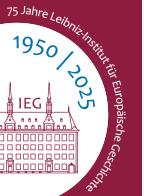Conception of the data competence centre HERMES - Humanities Education in Research, Data, and Methods
In the conception phase for the establishment of the HERMES data competence centre, the IEG is working with the partners to develop learning opportunities, research activities and networking formats to meet the need for training, further education and training, practice-oriented advice and interdisciplinary networking in the field of humanities and cultural studies research and in related application-oriented fields of activity (especially in GLAM institutions).
Through the joint establishment of a data competence centre at the interface of innovative digital methods and sustainable data curatorial practice, HERMES functions as a cross-location network anchored in the federal states of Hesse and Rhineland-Palatinate, which bundles the existing complementary expertise of the supporting institutions at (real and virtual) teaching, research and networking locations, creates a framework for the innovative application and further development of data science methods in the humanities and cultural sciences and contributes to the establishment of a critical data culture in the participating disciplines.
HERMES is established as a regionally distributed, decentrally coordinated network at the Darmstadt, Frankfurt, Mainz, Marburg and Trier locations and is supported by the Technical University of Darmstadt, the Darmstadt University of Applied Sciences, the German National Library, the Academy of Sciences and Literature in Mainz, the Leibniz Institute of European History, the Mainz University of Applied Sciences, the Philipps University of Marburg, the Herder Institute for Historical Research on East Central Europe and the University of Trier.Through the joint establishment of a data competence centre at the interface of innovative digital methods and sustainable data curatorial practice, HERMES functions as a cross-location network anchored in the federal states of Hesse and Rhineland-Palatinate, which bundles the existing complementary expertise of the supporting institutions at (real and virtual) teaching, research and networking locations, creates a framework for the innovative application and further development of data science methods in the humanities and cultural sciences and contributes to the establishment of a critical data culture in the participating disciplines.




